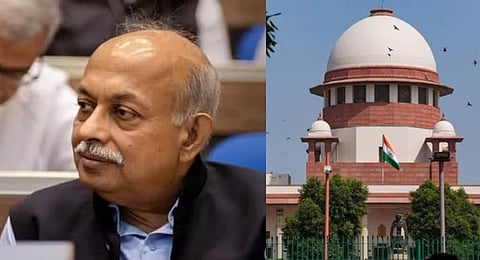

NEW DELHI: The Supreme Court on Tuesday held the extension given to Enforcement Directorate chief Sanjay Kumar Mishra after 2021 as "illegal" for violating the mandate of its 2021 judgment. In September 2021, it had directed the government not to extend Mishra’s tenure any further.
The apex court while reserving its judgement on pleas challenging the official's extension has allowed Mishra to stay in his post till July 31. Trinamool Congress MP Mahua Moitra and Congress leader Randeep Surjewala were among the petitioners.
The bench of Justices BR Gavai, Vikram Nath and Sanjay Karol while pronouncing the 103-page verdict, the bench said, “Impugned orders dated November 17, 2021 and November 17, 2022 granting extensions to the tenure of the respondent No.2- Sanjay Kumar Mishra for a period of one year each are held to be illegal. Sanjay Kumar Mishra is permitted to continue in office till July 31, 2023. The plea is partially allowed.”
The top court however affirmed the Central Vigilance Commission (Amendment) Act, 2021 and the Delhi Special Police Establishment (Amendment) Act, 2021 which granted the Centre power to extend the tenure of the Central Bureau of Investigation (CBI) chief and the ED chief by a possible three years beyond their mandatory terms (five years maximum.)
The bench said the scope of judicial review in legislative action is very limited and it can be interfered with only on three grounds--as to whether legislature was competent enough to legislate on the subject, whether it affects any fundamental right, and manifest arbitrariness. “We find that legislature is competent, no fundamental rights have been violated, and there is no manifest arbitrariness...extension can be granted to high-level officials such as this in the public interest and with reasons in writing,” the bench said.
The top court had on December 12 last sought the response from the Centre and others to a plea challenging the third extension granted to Mishra. It had issued notices to the Union of India, the Central Vigilance Commission and the ED director on a plea filed by Jaya Thakur which accused the central government of destroying the basic structure of democracy by misusing the enforcement agencies against its political opponents.
Meanwhile, the Centre had informed the Supreme Court that Mishra, 62, would not continue in office beyond November 2023 and was only granted the third extension keeping in view the ongoing peer review before the international terror financing watchdog Financial Action Task Force (FATF), and to enable smooth transition.
Solicitor General Tushar Mehta submitted before the bench that "the court must not interfere with Mishra's tenure". “This officer (SK Mishra) is not some DGP of any state but an officer representing the country in a United Nations-like body and is in the midst of something. This officer cannot continue after November 2023. But right now, the peer review of FATF is going on. It was supposed to happen in 2019 but could not due to the COVID lockdown,” Mehta argued. He added, "Nobody is indispensable. No organisation becomes ineffective in the absence of one particular individual but the presence of an officer who has been heading the institution for the past three years makes a difference."
Notably, the top court in its last hearing on the matter had asked if the government could not find any other officer to replace Mishra. Quizzing the government, the bench had asked, “Is there no other person in the organisation who can do his job? Can one person be so indispensable? Is there no one else in ED who is competent? What will happen post-2023 when he does retire?
Earlier, while opposing the Centre’s decision to extend Mishra's tenure as ED chief, Amicus Curae KV Vishwanathan termed the amendments in the law as well as the extensions as “illegal”. Vishwanathan had said that in order to have a better democracy, extensions should not be longer than the original tenure period. “No government should be able to misuse this provision. We have come to the sole conclusion that the notifications are invalid, purely as a matter of law, and not as malafide allegations,” he added.
The 1984-batch Indian Revenue Service officer was first appointed to the post on November 19, 2018. He was supposed to retire two years later upon completing 60 years of age. On November 13, 2020, the government with the help of an order increased his tenure from two to three years.
In September 2021, the Supreme Court had directed the government not to extend Mishra’s tenure any further.
However, on November 14, 2021, the Centre introduced two ordinances to extend the tenures of the directors of the Central Bureau of Investigation and the Enforcement Directorate to up to five years (earlier, central agency chiefs were appointed for two-year terms.) This paved way for Mishra to continue in his post for another year. On November 17, 2022, Mishra was given a third extension till November 18, 2023.
(With additional inputs from Online Desk)